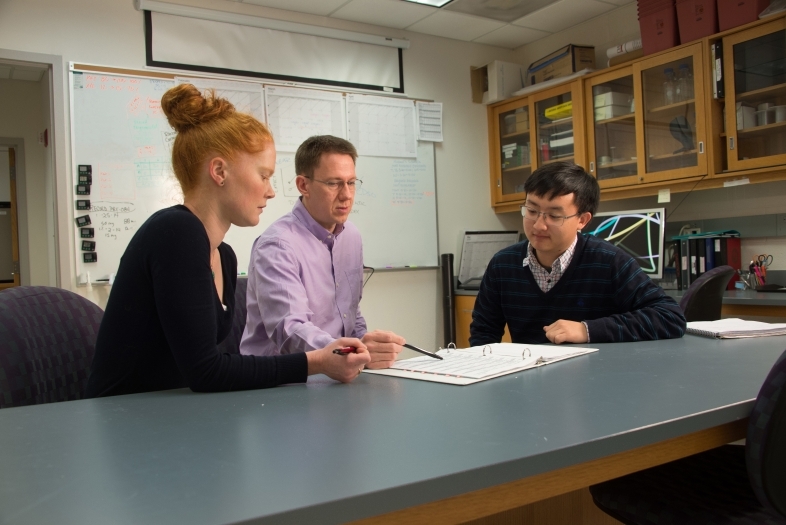
Research
Research is essential for hands-on learning, and undergraduate research experiences are now required for admission to many graduate and professional schools. The most elite graduate programs expect published research when you apply.
As a neuroscience student, you'll have many research and publication opportunities at Davidson, working independently with faculty guidance, working on research projects with professors, and doing research over the summer through the Davidson Research Initiative.
Independent Research
In BIO 3713/372, you'll do original, independent research in developmental biology and/or neuroscience under the guidance of a faculty member.
In BIO 352, Group Investigation in Developmental Neurobiology, you'll independently design and conduct an original research project using in vitro and/or in vivo techniques in vertebrate developmental neurobiology under the guidance of a faculty member.
PSY 195 and 330 offer independent research experiences with faculty in the areas of behavioral neuroscience and behavioral pharmacology. Students design, conduct, and analyze data from original experimentation in topics including neuroplasticity and drugs of addiction.
Research with Professors
Our professors have a wide variety of research interests, and often collaborate with students on projects, as well as co-author papers and articles with them.
In Professor Barbara Lom's lab, she and her students investigate how unconnected, individual neurons wire themselves together into a precisely interconnected and functional nervous system. Students working with Professor Lom can rapidly learn techniques such as microsurgery, microinjection, fluorescence microscopy, time-lapse microscopy, morphometric analysis, immunostaining, in vivo transfection, and/or primary culture of retinal neurons. She has co-authored articles with students for journals including Environmental Toxicology & Chemistry and Impulse.
Professor Julio Ramirez has been conducting research on recovery of memory function through neuronal sprouting following brain injury for more than 30 years. His work has involved more than 100 Davidson students as research assistants. Articles written with students have been published in scientific journals including The Journal of Neuroscience, Restorative Neurology and Neuroscience and NeuroReport.
Professor Mark Smith's research involves the biochemical and behavioral effects of opioids, a class of drugs that are used extensively for both clinical and recreational purposes. He uses student assistants in his research, and has published articles with student coauthors for publications including Drug and Alcohol Dependence, Psychopharmacology and Pharmacology, Biochemistry and Behavior.
Professor El Bejjani and his students use molecular genetics and microscopy techniques in the invertebrate model organism, C. elegans, to investigate the cellular and molecular mechanisms of nerve regeneration and connectivity. Students in the El Bejjani lab perform molecular cloning, genome editing, worm transgenic generation, fluorescence imaging, and laser surgery. Additional projects use the same methodologies to investigate the molecular mechanisms of skin integrity and relationship to skin defects in humans.
Summer Research
There are opportunities for you to do neuroscience research over the summer at Davidson through the Davidson Research Initiative.
Fellowships are competitive awards and programs that provide funding and other resources for meaningful immersive work, like research, teaching, or service. Like scholarships, fellowships can also support academic study.
These featured fellowships support a variety of experiences in and outside of the U.S. Interested candidates should contact Davidson’s Office of Fellowships to learn more about these fellowships and other programs.